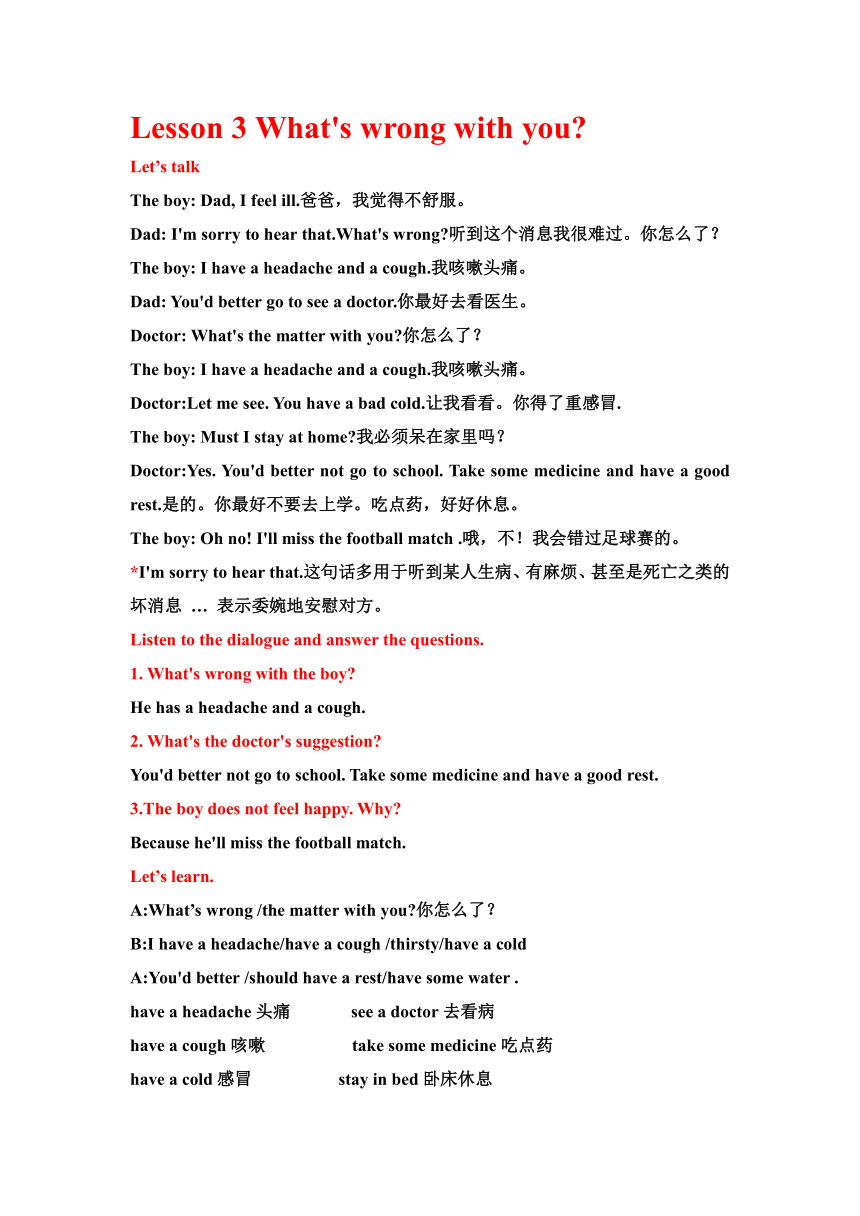
Lesson3 What's Wrong With You? Let’s talk 1.Dad, I feel ill.爸爸,我觉得不舒服。 2.I'm sorry to hear that.What's wrong?听到这个消息我很难过。你怎么了? 3.I have a headache and a cough.我咳嗽头痛。 4.You'd better go to see a doctor.你最好去看医生。 5.What's the matter with you?你怎么了? 6.I have a headache and a cough.我咳嗽头痛。 7.Let me see. You have a bad cold.让我看看。你得了重感冒. 8.Must I stay at home?我必须呆在家里吗? 9.Yes. You'd better not go to school. Take some medicine and have a good rest.是的。你最好不要去上学。吃点药,好好休息。 10.Oh no! I'll miss the football match .哦,不!我会错过足球赛的。 I'm sorry to hear that.这句话多用于听到某人生病、有麻烦、甚至是死亡之类的坏消息 … 表示委婉地安慰对方, Let’s learn. A:What’s wrong /the matter with you?你怎么了? B:I have a headache/have a cough /thirsty/have a cold A:You'd better /should have a rest/have some water . have a headache头痛 see a doctor去看病 have a cough咳嗽 take some medicine吃点药 have a cold感冒 stay in bed卧床休息 Work in pairs. tired have a rest thirsty have some water drink cold milk work watch TV play I feel hungry. You’d better eat some bread. I feel ill. You'd better not eat too much.你最好别吃太多。 I feel thirsty/tired A:What’s wrong /the matter with you? B:I have a headache/have a cough /thirsty/have a cold. A:You'd better /should have a rest/have some water . A:You'd better /should see a doctor. A:You'd better /should take some medicine. A:You'd better /should stay in bed. A:You'd better /should not drink cold milk/watch TV. 语法: 一、You'd better =You had better 这个句型用来建议别人“最好做……”,后面跟不带"to"的动词不定式。也可以说"had best",但不那么常用。 You'd better hurry up if you want to get home before dark. 如果你想天黑前到家就抓紧时间。 1.在口语中常省略成’d better或better.如: 你最好小心点. 正:You had better be careful. 正:You’d better be careful. 正:Better be careful. 2.注意否定式、疑问式及其回答.如: You’d better not go there.你最好不要去那里. He’d better go with us,hadn’t he?他最好同我们一块去,对吗? What had we better do?我们最好做什么? Had we better not go?我们不去好不好? 比较:Hadn’t we better go?我们去不是更好吗? 3.可接进行式、被动式或完成式.如: I’d better be going now.现在我得走了.(心情近切) She’d better be met by him.最好他去接她. You’d better have done that.你要是把那件事办了就好了. 4.注意:①此结构中的 had 永远不可改为 have 或 has;②对上级或长辈不宜用此结构. 二、情态动词 1. 概念:在句中通常用来表示“能力”、“允许”、“必要”、“禁止”、“意愿”、“可能”等情感或态度的动词。这类动词词义不完整,不能单独作谓语,只能和实义动词一起构成谓语,且无人称和数的变化,后面必须跟动词原形。 常见的情态动词有:can, may, must, need, have to, be able to, had better, will, should, would等。 注意:有些词是兼类词。如: He is having a meeting. 他正在开会。(have是实义动词) He has gone to New York.. 他已去了纽约。(have是助动词) 2. 情态动词种类: can和could: 意义:can表示某人或某物能做某事,意思是“能够;可以”,如: can cook the meals c ... ...
~~ 您好,已阅读到文档的结尾了 ~~

